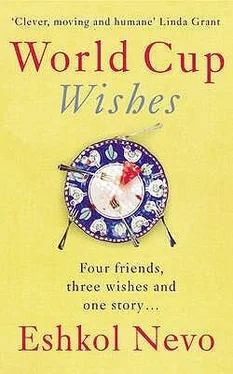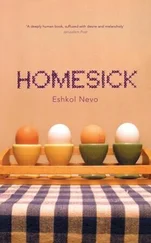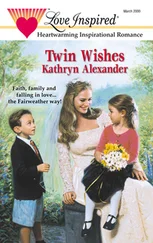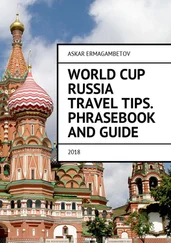*
True, I admitted to myself, everything is very bland now. And far from being happy. But perhaps I could drag myself through another few months, till the World Cup, and climb onto the window ledge only after the final match?
The question of how many months there were till the World Cup — exactly how many months would I have to carry on — suddenly bothered me a great deal.
For the first time in an age, I reconnected the phone and called Amichai.
Tell me, Bro, I asked in a rusty voice, when does the World Cup start?
Wait just a minute, he protested. What’s happening with you? I left you loads of messages. There’s going to be an absolutely final performance of the Chameleons and we thought we’d all go together. Where did you disappear to?
I’ll tell you in a minute, I lied. Just tell me first when the World Cup is. It’s important.
It usually starts in June and ends in July, doesn’t it?
Another nine months, I calculated quickly. That’s a lot, but not eternity. Perhaps it was still worth waiting.
You know, Amichai said, I still have the World Cup wishes we wrote.
What wishes?
The ones we wrote at the last World Cup, don’t you remember? We each wrote on a slip of paper where we thought we’d be in another four years. Where we wanted to be.
And you kept them?
Yes, they’re here. In a shoebox. I haven’t touched them since then, but a while ago, I was taking some of Ilana’s things out of the back of the wardrobe and saw that they were still there. Four nicely folded slips of paper. We’ll unfold them during the final, right?
Sure, sure we’ll unfold them. That should be really amazing.
Wow, so many things have happened since then, Amichai said, it’s hard to believe that less than four years have passed.
I didn’t say anything. Lots of things really had happened to him and the others, I thought, but to me?
It’s a good thing we have the World Cup, I finally said. That way, time doesn’t turn into a big lump and you can stop every four years and see what’s changed.
You said the same thing then.
What?
That remark about time … that it’s a big lump.
I said something like that?
Who else but you can philosophise that way?
*
As I recreate that fateful phone conversation with Amichai, it seems to me that the light bulb didn’t flash right away. It took another few minutes for the current to reach the wires.
Meanwhile, Amichai talked about other things. And at some point, between his story about what Nimrod had done on a family trip to the Judean Desert — he’d climbed onto his lap and asked him, Daddy, where’s your smile? — and the report on two female interns in the legal branch of the NPO who had complained to him the day before that Churchill was always hitting on them — it lit up.
Like a spectacle. Suddenly I saw it before my eyes: the Bahai Gardens.
I cut the conversation short despite Amichai’s protests (but you haven’t told me anything about yourself yet! You always do that! It’s not right!), and after I’d put the phone down, I picked up a sheet of paper and wrote down our names.
Next to each friend’s name, I wrote the wish he’d read out at the World Cup four years ago.
And I began to draw lines.
Churchill was ousted from the case before he’d been able to fulfil his wish ‘to be involved in something that would bring about true social change’, but on the other hand, he’d been granted my wish: to be with Ya’ara.
Amichai hadn’t fulfilled his wish to open a clinic for alternative treatment, but he’d founded the Our Right NPO, thus fulfilling Churchill’s wish to be involved in something that would bring about true social change.
Ofir didn’t publish a book of short stories, neither in Hebrew nor in ancient Danish, but the natural knowledge, stronger than any piece of paper, the same knowledge that makes an olive tree seedling turn in an olive tree and not anything else, led him to fulfil Amichai’s wish and open a clinic for alternative treatment.
I stopped for a moment and looked at the page.
Only one line remained to be drawn. Only one line separated the four of us from an amazing, almost Bahai-like symmetry in which none of us had fulfilled our own wish from the last World Cup, but each had fulfilled one wish to the right of his own, his friend’s wish. For that last line to be drawn and the symmetry to be perfect, I had to fulfil Ofir’s wish: to write a book.
I imagined the end of the 2002 World Cup, and Amichai taking the papers out of the shoebox, and each one of us taking his. Then Amichai unfolds his and reads his wishes and laughs in embarrassment. And after him, Churchill, who stammers a bit when he reads the wish about Keren. Right after that, to blunt the effect of his words, he urges Ofir, come on, Bro, your turn. And Ofir hands Maria their baby boy (girl?) so his hands will be free, unfolds it and reads, and the first glint of suspicion, of understanding, shines in Churchill’s eyes, but it isn’t until I read my three Ya’ara wishes that he begins to notice the shifts I see in front of me now, and for a few seconds, you can see the lines I’ve just drawn on the page being drawn in his mind’s eye, until the full beauty of the entire Bahai garden fills his head, and he taps me on the shoulder and says, man, if you went and wrote a book, we’d have one hell of a situation here. And while he explains to Ofir and Amichai what he means, and what a waste it is that I’m the only who hasn’t fulfilled my part in the symmetry, I bend over my briefcase in slow motion, and take out the book I’ve written secretly over the last nine months.
*
Desire flared in me at that moment: to create the focal point, the one without which there is no symmetry, to do my part, to complete the picture, to add the missing instrument so that our quartet could play the harmonic music that the guide in the Bahai garden had spoken of. Everything depends on me, I thought with awakening enthusiasm. If I don’t do anything, it will all be pointless, like a messy room in a hostel, but if I dare to write the book that Ofir dreamed of, that would be so symmetrical, so beautiful, like an elegant philosophic proof, like an exact translation of a sentence from English into Hebrew. Like a neat room. The kind I love.
For a few moments, I felt that finally, I had a purpose. Finally something inside me really wanted.
(And perhaps to tell it in a different, more genuine way: for several moments, I saw an opportunity to grab onto something before I was shot down once and for all. Before I gave up. I wasn’t sure it would really help. I wasn’t sure I hadn’t already reached the point of no return. But for several moments, I thought that perhaps —)
*
But at the very end of those lovely moments stood my father, holding a bucket of cold water. Freezing water.
Write a book? Are you serious? He tilted the bucket over my head. Who are you to write a book?
1While in all other places in the book, Mr Freed’s descriptions, even if they are inaccurate, are based on a kernel of truth, here, in this short paragraph, he so distorts reality that even I, as editor and friend, find it difficult to accept. It was not we who withdrew into our own private cocoon during that period, but he himself. My spouse and I invited him to our home many times and he never bothered to respond to our invitations. I have no idea why Mr Freed chose to paint a picture in which his friends abandoned him. Perhaps in order to justify his own escape into writing a book and making us its protagonists without informing any of us. Perhaps for the pleasure latent in self-pity of this kind. And perhaps every narrator is always limited to his own point of view. After all, if each of us, his friends, had been asked to tell the story of the last four years, four different stories would certainly have emerged, and rightly so. Be that as it may, in this case, the bare facts do not fit with Mr Freed’s claims. Not for a moment did my spouse and I stop taking an interest in what he was doing, in his mood and the condition of his asthma. Not for a moment did we stop being grateful to him for the large gifts he gave to us both, for the refuge and consolation and true friendship. Yet despite all of the above, Mr Freed did indeed feel that we had abandoned him, and I can only apologise to him for that (and owing to his present condition, he is unable to accept or reject my verbal apology, so I am offering it here, in writing). (Y.A.)
Читать дальше












